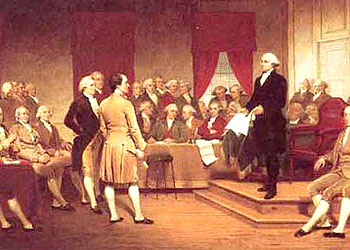2 Volumes
Constitutional Era
American history between the Revolution and the approach of the Civil War, was dominated by the Constitutional Convention in Philadelphia in 1787. Background rumbling was from the French Revolution. The War of 1812 was merely an embarrassment.
A Minor Politician
In 2013 I ran for the New Jersey Assembly, unsuccessfully. Daughter Miriam was my campaign Manager. I learned a lot from the experience. For example, I had 700,000 constituents. Maybe I shook hands with a couple hundred.
Fisher on Stuffing Ballot Boxes

|
| Stuff the Ballot Box |
Shortly before election last year, the papers were full of agitation about passing laws to require voters to identify themselves. That doesn't sound so burdensome, considering how teenagers pester you to get a driver's license when they reach a certain age. But, oh my goodness, it was a terrible thing to ask of voters who are barely able to crawl to the voting place, much too poor to afford a car, and grossly offended by the suggestion that anyone would dare to have such nasty suspicions. So, being new to the candidate business, I asked a few hardened old pros about it. Is there much voter fraud in Camden County? And if so, how is it accomplished?
For some reason, this innocent question was greeted with gales of laughter. When it settled down, two or three suggestions were offered. In the first place, said the old guy on a park bench, tell the poll watchers to be certain the voting machines have been set to zero before any voter uses them. How would requiring a driver's license prevent that kind of thing? It wouldn't; it depends on having poll watchers.
All right, what else? Well, there's the "old fashioned way". What that refers to is waiting until about an hour before the polls close, and there is nobody watching in the polling place because it's dinnertime. When the coast is clear, just take the list of registered voters who haven't yet voted -- and vote them for your party. Pretty smooth, right? And if you would be required to write down the driver's license number for every voter, it's pretty easy to spot deficiencies when the results get challenged. So, maybe requiring some sort of ID would be effective, and wouldn't amount to frisking a citizen. And then, there's a law to mention.
In New Jersey, and maybe elsewhere too, a poll watcher is required to be a resident of his district. So, a little old lady with knitting is unlikely to want to watch the polls in some of the tougher districts. For this, both parties employ "flying squads" of some of the party faithful who look like professional football players. One beep on the cell phone and this squad come flying. Well, my Goodness me.
Written several months later:
Judge Richard Posner, whose writings I have come to admire greatly, was interviewed recently on television. Although he said he had written earlier that he saw nothing wrong with asking voters to identify themselves, he now reverses himself and concludes that voter identification laws prevent more people from voting than they prevent fraud. He bases this opinion on what someone tells him is credible evidence, but I'm afraid I neither believe the evidence nor think it is an important way to think about this issue.
I believe the most important issue is to have the public believe the elections were fair, so we don't get more civil disobedience stirred up by political "contractors", or in spite of heated fanaticism heating up in the last few days of an election. There are numerous examples of candidates who supported a fraudulent election of their opponent, rather than have his own supporters injure the reputation of our procedures. Somebody has to win an election, and the election has to be seen as final. In our system, any close election could probably be reversed by a well-managed recount and reversed again on re-recount. To discover large frauds, even if potentially balanced by improved enfranchisement, is to discredit the election process. And since there are many local polling districts near me which have not had dual poll watchers for twenty years, the suspicion of voter fraud in those districts is quite a natural one. I"m not sure what the issues are, surrounding the credibility of absentee ballots.
All I know is a lot of people are increasingly resorting to them because they distrust the conventional polling places. If that's what it takes to convince people the elections are fair, let's try it out wholesale in some districts where obtaining dual poll watchers has been difficult. Like Chicago, for instance?
Fisher on Representation Size
Fisher on Representation Size
|
||
| Constitutional Convention in 1787 |
According to the last census, my Legislative district (#6 in New Jersey) has 224,000 residents. If I spent five minutes talking to each one, I wouldn't have time to sleep or eat. Therefore, I get mixed feelings when I hear only 43,000 of them are registered voters, and only 23,000 of them turned out for the last election. I guess I could talk to that many, but it is pretty sad only one resident in ten bothers to vote. The same number of people voted for every R candidate, and the same number of D's voted for almost every D candidate. So, it looks as though a lot of people vote a straight-party ballot.
That's something they surely wouldn't do if they knew each candidate. And that's pretty sad because it is easily managed by party machines. I have to think these things are caused by the steady growth of the population, without comparable growth in the number of representatives, at all levels from township commissioner to President of the United States.
George Washington was bothered by the same problem. In 1787 he had nothing to say about issues during all the time he was the presiding officer of the Constitutional Convention. But on the last day of the convention, he asked for permission to step down and address the group. His conviction was that no congressman should represent more than 30,000 people, and he begged for an amendment providing for it. The delegates meant to oblige him, but somehow it got lost. If they had done what he asked, we would now have about 5000 congressmen, so it doesn't sound workable. As a practical matter, in the early 1920's Congress finally limited the size of its members to 436. So now we have exactly what Washington feared, which is each Congressman represents 700,000 people, nobody knows his congressman, it costs millions of dollars to get elected, party machines dominate what decisions aren't dictated by lobbyists.
Exactly the same thing is true of legislative districts, except the lobbyists are probably less well funded. They seem to search for party machines and spend their time (and money) on unelected party leaders. Unelected is an important word here because many county leaders take care not to hazard their future on an election. I understand the county leader in Mercer county lives on eighteen acres in the center of Princeton. I don't know his name, in fact, almost nobody knows his name, but everybody knows that God himself couldn't afford eighteen acres of Princeton. I got this from a reporter, Bob Ingle, for the Trenton newspaper who wrote a book, called Soprano State. I wish more people would read that book, so I don't have to sound so negative at times. I gather from this book, there is much to talk about.
Anyway, this representation issue is starting to hurt. I go to all kinds of meetings in my district, at least to show my face. Little did I expect I would be sitting in the audience while a professor of history, would explain that Washington's proposal was already part of the Constitution. I woke up slowly and may have got this wrong, but I believe he said it was one of the two (of the twelve original) amendments of the Bill of Rights that Thomas Jefferson recorded as not being ratified. However, Kentucky was a long way away by horseback, and the ratifiers seem to have given up on the messenger who was bringing the duly recorded, on-time, ratification from Kentucky needed to reach the required number. I guess when it got to be dinnertime they decided no messenger meant no ratification.
However, Mr. LaVerne seems to have dug up photocopies of the Kentucky document of ratification, plus the bylaws stating amendments were to be effective as of the date of ratification. Somehow, the War of 1812 got things confused even more and burnt up enough, that Washington's pet idea sort of got lost. If that's really provable, it seems to mean we already have a mandate to have 5000 congressmen (and two or three thousand Assemblymen and women in New Jersey?). The contention seems to be that for two hundred years nobody knew what to do with this bit of history, and sort of decided to ignore it. My view is that even if you knew all about this strange history, you simply can't have it both ways. Either you get stuck with the present inability to represent all those constituents, or else you get stuck with having unworkable thousands of congressmen.
I promise to think about this. And when I get an answer, I'll let you know.
East Jersey's Decline and Fall
The colony of New Caesaria (Jersey) had two provinces, East and West Jersey, because the Stuart kings of England had given the colony to two of their friends, Sir George Carteret and John, Lord Berkeley, to split between them. Both provinces soon fell under the control of William Penn but it took a little longer to acquire the Berkeley part, so the Proprietorship of East Jersey was the oldest corporation in America until it dissolved in 1998.
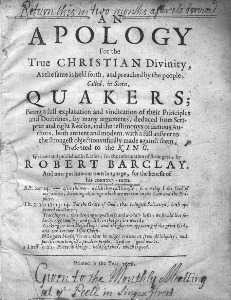 |
| Apology for the True Christian Divinity |
It would appear that Penn intended West Jersey to be a refuge for English Quakers and East Jersey was to be the home of Scots Quakers. Twenty of the original twenty-four proprietors were Quakers, at least half of them Scottish. Early governorship of East Jersey was assumed by Robert Barclay, Laird of Urie, who was certainly Scottish enough for the purpose, and also a famous Quaker theologian. Even today, his Apology for the True Christian Divinity is regarded as the best statement of the original Quaker principles. However, Barclay remained in England, and his deputies proved to be somewhat more Scottish than Quaker. Eighteenth-century Scots were notoriously combative and soon engaged in serious disputes with the local Puritans who had earlier migrated into East Jersey from Connecticut with the encouragement of Carteret. This enclave of aggressive Puritans probably provided the path of migration for the Connecticut settlers who invaded Pennsylvania in the Pennamite Wars, so the hostility between Puritans and Quakers was soon established. The Dutch settlers in the region were also combative, so the eastern province of Penn's peaceful experiment in religious tolerance started off early with considerable unrest. Of these groups, the Scots became dominant, even referring to the region as New Scotland. To look ahead to the time of the Revolution, most of the East Jersey leadership was in the hands of Proprietors of Scottish derivation, with at least the advantage that these were likely to have been very vigilant in seeing Proprietor rights originally conferred by the British King, continue to be honored by the new American republic.
East Jersey was probably already the most diverse place in the colonies when loyalists and revolutionaries took opposite sides in the bitter eight-year war over English rule, with hatred further inflamed when the victors in the Revolution divvied up the properties of loyalists who had fled. The earlier conflict was created by management blunders of the Proprietary leadership itself. Instead of surveying and mapping, before they sold off defined property, like every other real estate development corporation, the East Jersey Proprietors adopted the bizarre practice of selling plots of land first and then telling the purchaser to select its location. In the early years, it is true that good farmland was abundant, but inevitably two or more purchasers would occasionally choose overlapping plots of land. The Proprietors were astonishingly indifferent to the resulting uproar, telling the purchasers that this was their problem. The outcome of all this friction was that settlers petitioned London for relief, and in 1703 Queen Anne took governing powers away from both the East and West proprietorships and unified the two provinces into a single crown colony. The Queen obviously nursed the hope that South Jersey would impose a civilizing influence on the North, but immigration patterns determined a somewhat opposite outcome. Both proprietorships, however, were allowed to continue full ownership rights to any remaining undeeded property.
In later years, the East Jersey Proprietors created more unnecessary problems by attempting to confiscate and re-sell pieces of land whose surveys were faulty, sometimes of a property occupied with houses for as much as fifty years. This East Jersey proprietorship, in short, did not enjoy either a low profile or the same level of benevolent acceptance prevailing in the West Jersey province. A climate of skepticism developed that easily turned any management misjudgment into a confrontation.
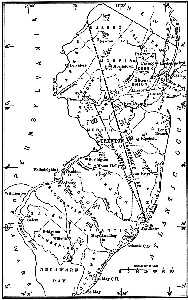
|
| New Jersey Line |
The East Jersey proprietorship operated by taking title to unclaimed land, and then reselling it. In what seemed like a minor difference, the West Jersey group never took title itself, but merely charged a fee for surveying and managing the sale of unclaimed land. The upshot of this distinction was that the East Jersey group got into many lawsuits over disputed ownership, which the West Jersey Proprietorship largely escaped. The nature of unclaimed land in New Jersey is for ocean currents to throw up new islands in the bays between the barrier islands and the mainland, or pile up new swampland along the banks of the Hudson and Delaware Rivers. Such marshy and mosquito-infested land may have little value to a farmer but lately has become highly prized by environmentalists, who supply class-action lawyers with that nebulous legal concept of "standing". The posture of the West Jersey Proprietors is to be happy to survey and convey clear title to a particular property for a fee, but a buyer must come to them with that request. The East Jersey method put its proprietors in repeated conflict over possession and title, with idealists enjoying free legal encouragement from contingent-fee lawyers. By 1998, the Proprietors of East Jersey had endured all they could stand. Selling their remaining rights to the State for a nominal sum, they turned over their historic documents to the state archives. The plaintiff lawyers could sue the state for the swamps if they chose to, but the East Jersey Proprietors had just had enough.
The only clear thing about all of this is that the Proprietors of West Jersey now stand unchallenged as the oldest stockholder corporation in America. It's not certain just what this title is worth, but at least it is awfully hard to improve on it.
Boundary Disputes
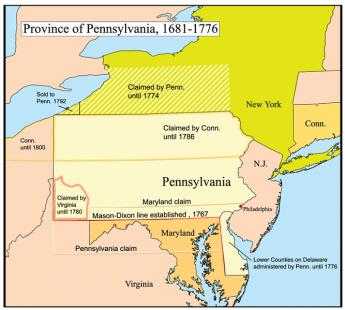
|
| Four Corners of Pennsylvania |
When you talk boundaries, a good lawyer is what you need. Pennsylvania had the best in William Penn. Prior to 1776, the boundaries between the American colonies were settled in London, either by the King or the British courts. After 1787, disputes over boundaries were settled in the United States Federal Courts, acting under Section III of the Constitution. Generally speaking, boundaries were first created by treaties, by Kings, and by Congress. Boundary disputes were then settled in the courts, first in England, and later in Federal Courts. Between 1776 and 1787, however, the Articles of Confederation governed. The immediate problem was that the Articles were not finally ratified until 1781. A technical problem was that surveying instruments were improving during this period. The judicial problem was that a body of law was evolving about when to use the deepest channel of a river or when to use the half-way point between the two banks of a river, and when to use just one bank of the river or the other. And the political problem was that major immigration made everyone less care-free about boundaries of the land which were steadily growing more valuable. The American period under the Articles of Confederation was one big argument about state borders.
A century earlier, when British kings were handing out charters to those adventurous enough to accept them, there was plenty of cheap lands if someone could defend it. The common approach to granting charters was to pick two points along the Atlantic, and from there to extend lines westward as far as they could go. When the lines bumped into lines given to other colonies, there were countless lawsuits and occasionally little wars. Only the three Quaker colonies of New Jersey, Pennsylvania and Delaware were formed late enough in the colonial period to enjoy practical ways even to define a western border. Virginia, the largest colony, officially extended itself to include what is now Kentucky and West Virginia, and had reasonably defensible claims to all the land of the Northwest Territory, on the western side of the defined Pennsylvania western border, all the way north to the Great Lakes. When the Indians finally woke up to what was happening, they rebelled under the leadership of Pontiac and Tecumseh and were helped in their massacres of white settlers by the French, later by the British. Peaceful rectangular Pennsylvania experienced armed nibbles at each of its four corners; from Maryland in the southeast, Virginia in the southwest, Connecticut in the northeast. On its northwestern corner, Pennsylvania had the award of the Erie connection to the Great Lakes to settle an overlapping conflict between Connecticut and New York. The Articles of Confederation, composed mostly with common defense against England in mind, were deliberately inadequate to govern disputes between allies within the revolters. Discovering remarkable subsidence of such disputes after the installation of the Constitution, this might well have become a major reason for replacing the Articles of Confederation if it had been foreseen. But that was scarcely the case. The American colonists simply had no idea the Union would make such disputes immediately seem trivial if still remaining fairly numerous. When the advantages of peaceful unification are considered by other nations on other continents, consideration really should highlight the sense of delight America felt at the discovery of this unexpected bounty. At a minimum, it helped us ignore the many fumbles we also experienced.
What Is the Purpose of a National Constitution?
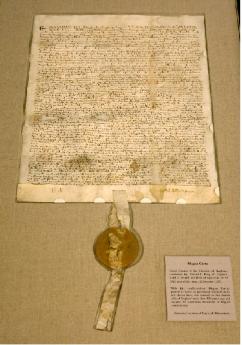
|
| 13th Century Magna Carta |
NATIONAL constitutions are mainly an outgrowth of the 18th Century Enlightenment, even though similar features are to be found among ancient legal codes. Those who trace the origins of the American constitution to the 13th Century Magna Carta will usually point to a central sentence of clause 39:
No free man shall be arrested, or imprisoned, or deprived of his property, or outlawed, or exiled, or in any way destroyed, nor shall we go against him or send against him, unless by legal judgement of his peers, or by the law of the land.
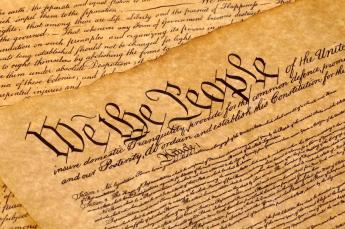
|
| American Constitution |
That's a pretty good beginning, a good example of a needed legal principle, but unrecognizable as what we would today call a Constitution. It states what a government may not do, but does not define the nature of a government which does the job best. Nor do even the many Enlightenment philosophers of government take that final step of outlining where their notions should take us until the American Constitution had been written and defended in the Federalist papers. Nowhere among the writings of Montesquieu (The Spirit of the Laws, 1748), Catherine the Great (Nakaz, Instructions to the All-Russian Legislative Commission, 1767), Diderot (Observations About Nakaz, 1774), James Madison (1787), John Dickinson(1763) or Gouverneur Morris(1787) can there be found much tightly described definition of a constitution. Certainly, there is no definition within the writings of Adam Smith if we look for rule-making among Enlightenment thinkers whose ideas were influential on the 1787 Philadelphia document. The American constitution was the product of many minds, before and after 1787. The outlines of its final form converged, and emerged, from the Constitutional Convention of the summer of 1787, with Gouverneur Morris as the penman of record. To him, we certainly owe its succinctness, which is the main source of affection for the document. That probably understates matters; in his diary of the secret meetings, James Madison records that Gouverneur Morris rose to speak about 170 times, more than any other delegate. Lots of thought and debate; ultimately, few words.
The Elizabethan Sir Francis Bacon has the greatest claim on devising a theory of law and law-making in the Anglosphere tradition. But his elegant modification of Galileo's scientific method, the English Common Law, is more a methodology for creating good laws than an outline of a nation's legal principles. Anyway, tracing the American Constitution back to an underlying British one tends to stumble when the British Constitution fails to meet a definition which would include our own. The British Constitution is said to be "unwritten" to the degree it is a consensus of revered documents. It can be amended by Parliament at will, has a variable history of defining just who is covered by it, and in order to define constitutional principles seems to rely on sentences extracted from difficult context. If the two constitutions had been written and compared at the same time, one would say the British had sacrificed coherence out of respect for tradition. In fairness, some features of the American constitution are also perhaps unnecessary for every constitution, but by surviving as the oldest constitution of the modern form, have become its model. That would be:
A set of principles governing the legitimacy of a nation's laws, and firmly standing above them. It defines its own domain, geographically and by the membership of a defined citizenry. Except as otherwise defined, it supersedes all other governance within its domain. It defines and defends its own origins. It includes a description of how to amend it, which is intentionally infrequent and difficult. It goes on to outline the structure of the laws it regulates, with subtle modifications made to channel the type of power structure which will govern.
In the American case, history and culture generated several other instabilities so central they justified heightening the difficulty to amend them to a Constitutional level, thus conferring undisputed dominance over competing principles of governance. That would be:
A separation of government powers weakened all potentially offending branches of government, and thus enhanced citizen liberty. Separation of church from state, for like purpose. A right of citizens to bear arms, to strengthen citizens' defense against internal or external attack, and perhaps also warning that revolt must be possible, even endorsed, as some final extremity of protection for citizen sovereignty.
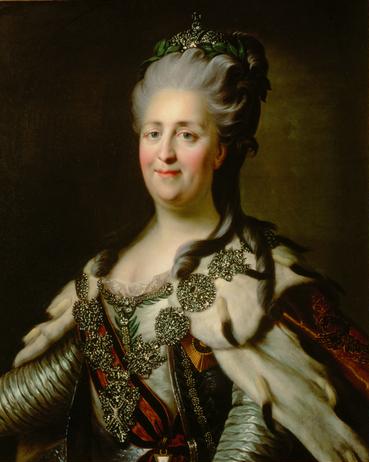
|
| Russia's Catherine the Great |
It enhances our comprehension to contrast the outcomes of competing 18th Century implementations of the Constitution idea. Russia's Catherine the Great proposed a constitution steeped in the traditions of the Enlightenment but ultimately designed to define and strengthen the role of the monarch. Denis Diderot her French protege recoiled at this viewpoint, substituting other views resembling those of Jean Jacob Rousseau. He opened Observations About Nakaz his commentary to the Queen, with the following declaration:
There is no true sovereign except the nation; there can be no true legislator except the people. Whether looking back to the English Civil War or forward to future disputes between the Executive and Legislative branches, it makes clear the Legislative branch was dominant, with the Executive branch acting as its agent.
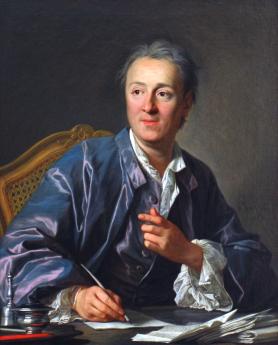
|
| Denis Diderot |
With this ringing warcry, the French model nevertheless ushered in the extremes of the Terror, the Guillotine, and the Napoleonic conquests. The consequences of the French constitution undermined world confidence in the benevolence of public opinion, at least deeply confounding those for whom the democratic rule was not totally discredited. Once more new life was breathed into allegiance for the monarchy, military rule, and dictatorship. Public opinion, it seemed, was not either invariably benign or comfortably far-seeing. The noble savage, mankind naked of tainted civilization, was not necessarily wise or worthy of trust. Edward Gibbons, the 1776 author of The Decline and Fall of the Roman Empire was pointing out where it all might lead if we completely believed in the collective goodness of the human condition. At the least, the failure of the French Revolution complimented the viewpoint of the Scottish philosopher, Adam Smith, who also in 1776 emphatically urged a switch in that reliance toward a sense of enlightened self-interest, as follows:
It is not from the benevolence of the butcher, the brewer, or the baker, that we can expect our dinner but from their regard to their own interest.
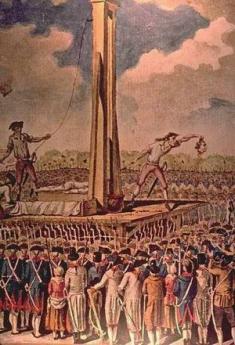
|
| Terror, the Guillotine, |
It is not surprising that Diderot rejected the Leibniz view of things that "All is for the best, in this best of all possible worlds." And, in view of his dependence on Catherine, not surprising he did not publish his rejection of it until 1823. Thomas Jefferson was in France as ambassador during the time of the American Constitutional Convention, fearing to confront George Washington; and likewise keeping his conflicting views private for several years. Eventually, they surfaced in the creation of an anti-Federalist political party along with the conflicts which kept the new nation in a turmoil for the following forty years. It is surely a testimony to the strength of the Constitution's design that the country was able to shift between such extreme governing philosophies but still hold together without changing the governing statement of purpose. Indeed, it is plausible to contend that our two political parties still continuously debate the useful tension between these two differing opinions.
Aftermath: Who Won, the States or the Federal?
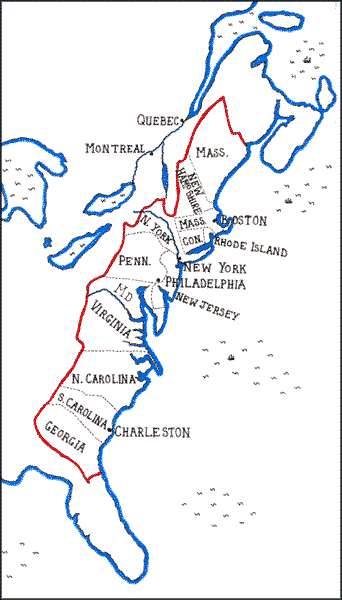
|
| Thirteen Sovereign States |
In the case of the American Constitution, the initial problem was to induce thirteen sovereign states to surrender their hard-won independence to a voluntary union, without excessive discord. Once the summary document was ratified by the states, designing a host of transition steps became the foremost next problem. The dominant need at that moment was to prevent a victory massacre. The new Union must not humble once-sovereign states into becoming mere minorities, as Montesquieu had predicted was the fate of Republics which grew too large. Nor must the states regret and then revoke their union as Madison feared after he had been forced to agree to so many compromises. As history unfolded, America soon endured several decades of romantic near-anarchy, followed by a Civil War, two World Wars, many economic and monetary upheavals, and eventually the unknown perils of globalization. When we finally looked around, we found our Constitution had survived two centuries, while everyone else's Republic lasted less than a decade. Some of its many flaws were anticipated by wise debate, others were only corrected when they started to cause trouble. Still, many tolerable flaws were never corrected.
 Great innovations command attention to their theory, but final judgments rest on the outcome. 
|
| . |
Benjamin Franklin advised we leave some of the details to later generations, but one might think there are permissible limits to vagueness. The Constitution says very little about the Presidency and the Judicial Branch, nothing at all about the Federal Reserve, or the bureaucracy which has since grown to astounding size in all three branches. Political parties, gerrymandering, and immigration. Of course, the Constitution also says nothing about health care or computers or the environment; perhaps it shouldn't. Or perhaps an unmentioned difficult topic is better than a misguided one. Gouverneur Morris, who actually edited the language of the Constitution, denounced it utterly during the War of 1812 and probably was already feeling uncomfortable when he refused to participate in The Federalist Papers . Madison's two best friends, John Randolph, and George Mason, attended the Convention but refused to sign its conclusions, as Patrick Henry and Thomas Jefferson almost certainly would also have done. On the other hand, Alexander Hamilton and Robert Morris came to the Convention preferring a King to a President, but in time became enthusiasts for a republic. Just where John Dickinson stood, is very hard to say. Those who wrote the Constitution often showed less veneration for its theory, than subsequent generations have expressed for its results. Understanding very little of why the Constitution works, modern Americans are content that it does so, and are fiercely reluctant about changes. The European Union is now similarly inflexible about the Peace of Westphalia (1648), suggesting that innovative Constitutions may merely amount to courageous anticipations of radically changed circumstances.
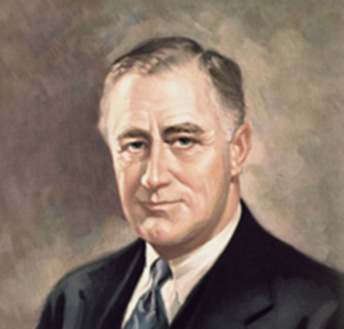
|
| President Franklin Roosevelt |
One cornerstone of the Constitution illustrates the main point. After agreeing on the separation of powers, the Convention further agreed that each separated branch must be able to defend itself. In the case of the states, their power must be carefully reduced, then someone must recognize when to stop. If the states did it themselves, it would be ideal. Therefore, after removing a few powers for exclusive use by the national government, the distinctive features of neighboring states were left to competition between them. More distant states, acting in Congress but motivated to avoid decisions which might end up cramping their own style, could set the limits. The delicate balance of separated powers was severely upset in 1937 by President Franklin Roosevelt, whose Court-packing proposal was a power play to transfer control of commerce from the states to the Executive Branch. In spite of his winning a landslide electoral victory a few months earlier, Roosevelt was humiliated and severely rebuked by the overwhelming refusal of Congress to support him in this judicial matter. The proposal to permit him to add more U.S. Supreme Court justices, one by one until he achieved a majority, was never heard again.
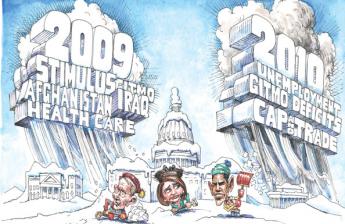
|
| Taxes Disproportionately |
Although some of the same issues were raised by the Obama Presidency seventy years later, other more serious issues about the regulation of interstate commerce have been slowly growing for over a century. Enforcement of rough uniformity between the states rests on the ability of citizens to move their state of residence. If a state raises its taxes disproportionately or changes its regulation to the dissatisfaction of its residents, the affected residents head toward a more benign state. However, this threat was established in a day when it required a citizen to feel so aggrieved, he might angrily sell his farm and move his family in wagons to a distant region. People who felt as strongly as that was usually motivated by feelings of religious persecution since otherwise waiting a year or two for a new election might provide a more practical remedy. However, spanning the nation by railroads in the 19th Century was followed by trucks and autos in the 20th, and then the jet airplane. While moving residence to a different state is still not a trivial decision, it is now far more easily accomplished than in the day of James Madison. A large proportion of the American population can change states in less than an hour if they must, in spite of a myriad of entanglements like driver's licenses, school enrollments, and employment contracts. The upshot of this reduction in the transportation penalty is to diminish the power of states to tax and regulate as they please. States rights are weaker since the states have less popular mandate to resist federal control. It only remains for some state grievance to become great enough to test the present power balance; we will then be able to see how far we have come.
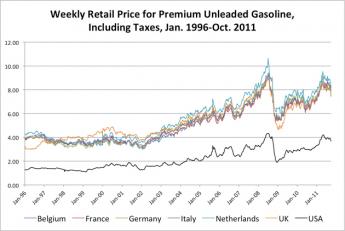
|
| High Gasoline Taxes of Europe |
Since it was primarily the automobile which challenged states rights and states powers, it is natural to suppose some state politicians have already pondered what to do about the auto. The extraordinarily high gasoline taxes of Europe have been explained away for a century as an effort to reduce state expenditures for highways. But they might easily be motivated by a wish to retard invading armies or to restrain import imbalances without rude diplomatic conversations. But they also might, might possibly, respond to legislative hostility to the automobile, with its unwelcome threat to hanging on to local populations, banking reserves, and political power.
It helps to remember the British colonies of North America were once a maritime coastal settlement. The thirteen original states had only recently been coastal provinces, well aware of obstructions to trade which nations impose on each other. Consequently, they could readily design effective restraints to mercantilism within the new Union. Two centuries later, repeated interstate quarrels provided fresh viewpoints on old international problems. As globalization currently becomes the central revolution in trade affairs of a changing world, America is no beginner in managing the intrigues of international commerce. Or to conciliating nation states, formerly well served by nation-state principles of the Treaty of Westphalia, but this makes them all the more reluctant to give some of them up.
How Does New Jersey State Aid Affect School Districts?
The Sunday, April 11, 2010 Philadelphia Inquirer contained an eighteen-page statistical summary of the schools within the eight-county area around Philadelphia. The New Jersey school districts, but not the Pennsylvania ones, report per-pupil spending right next to the proportion contributed by a state government. If you know something about the sociology of New Jersey, you form some conclusions about state school aid which probably apply to all states, while confessing they only provably apply to New Jersey. Let's therefore say, it only provably applies to New Jersey that you spend more on schools if you are spending someone else's money.
In the welter of numbers supplied by this statistical report, it seems useful to focus on the strip of school districts along Haddon Avenue, starting from the place where the retreating British soldiers once ferried from Philadelphia to Camden (in 1778, of course.) Haddon Avenue extends directly East until it strikes King's Highway, where the British then turned North to scuttle toward the safety of their navy at New Brunswick. We are thus talking about the school districts of Camden, Collingswood, Haddon Township, Haddonfield and Cherry Hill, with Haddon Heights and Pemberton thrown in because of special features they illustrate.

|
Pemberton Township in Burlington County spends the largest amount of per-pupil school money in South Jersey, $18,970. It jumps right out at you that 82% of that money is contributed to the school district by the state government. Starting back at the Delaware River, 99% nonwhite Camden gets 88% of its school money from the state and has the second-highest spending of $16,131 per pupil. Moving along the path of the British soldiers, the next town after Camden on Haddon Avenue in Collingswood, spending $14,262. Next comes Haddon Township, spending $13,243. It thus seems to prove that the further you get from the Delaware River, the less you spend on education, because next in order comes Haddonfield, with spending of $12,273. But not quite, because Cherry Hill increases a little to $12, 914. The percentage of state funds follows a parallel sequence from Collingswood to Haddonfield (36%, 31%, 6%) and then rises slightly to 11% in Cherry Hill. For comparison, nearby Haddon Heights spends $13,449, of which 10% derives from a state government. And just in case you think there is a racial implication, nearby Gloucester City is 84% white, and gets 82% of the $16,046 it spends on schools, from the rest of the state by way of state contributions. However, these numbers also allow you to calculate how much the local districts spent of their own money. It turns out it is just the reverse. The more state aid a district gets, the less it spends, itself. The more state aid it gets, the more it spends, period.
The conclusion seems to emerge that an education assistance program designed to achieve equality, actually stimulates appreciably more spending in poor districts than in prosperous ones; at least so far, poor educational quality in poor districts is acknowledged to remain poor. There are some people who might say these statistics suggest a racial correlation, but some others could say the correlation is with distance from Philadelphia, while others would associate factors undisplayed in the statistics. Because there are more non-teachers than teachers employed by the schools, it is not certain that extra money going to schools will improve the teaching. Nevertheless, what is not demonstrated at all is a tendency for better education to be found where school money is most liberally applied. At least, it is safe to say that anyone who claims the quality of education parallels these spending patterns in New Jersey, would be laughed at.

|
| Robin Hood |
Of course, it is true that prevailing opinions about the local quality of education are as biased as the opinions about the local football teams, or the differing quality of tomato pies. That's partly because the prevailing opinion of the school system has a strong effect on local real estate values, one of the main concerns of real estate agents. My neighborhood in Haddonfield is very close and sociable, so it's been confided that three empty-nest neighbors have sold their Haddonfield houses and moved to Haddon Heights to save money on taxes. When people make decisions like that, they generally know what they are doing. Available data, however, can be misleading to others because total school spending including subsidies does not reflect local property taxes, while local spending does. Empty-nesters are also very likely downsizing to less expensive homes, where of course the taxes seem lower and are also moving to districts which have fewer children per house. Where that isn't the case in the school districts from which they flee, subsidies are extracted from state income and sales taxes, which move from district to district, right along with empty-nesters who move. For those with children attending public schools, emphasis in these considerations is somewhat different.
The voters have no idea how "equal" became "more" money for education. A fair conjecture would be that the poorer districts kept pressing the legislature for more as a matter of "fairness", leaving the more prosperous districts to shout "outrage", but less effectively. By voting down a majority of local school budgets both groups are shouting, all right, although it would be more effective to shout at their representatives in Trenton. Especially in a census year, when gerrymandering is on every agenda.
George Washington Demands a Better Constitution
GEORGE Washington was a far more complex person than most people suppose, and he wanted it that way. He was born to be a tall imposing athlete, eventually a bold and dashing soldier. On top of that framework, he carefully constructed a public image of himself as aloof, selfless, inflexibly committed to keeping his word. Parson Weems the biographer may have overdone the image a little, but Washington gave Weems plenty to work with and undoubtedly would have enjoyed overhearing the stories of the cherry tree and tossing the coin across an impossibly wide Potomac. Washington had a bad temper and could remember a grievance for life. He married up, to the richest woman in Virginia.

|
| Potomac River |
Growing up along the wide Potomac River, Washington early conceived a life-long ambition to convert the Potomac into America's main highway to the Mississippi. He did indeed live to watch the nation's new capital start to move into the Potomac swamps across from his Mount Vernon mansion, in a city named for him. For now, retiring from military command with great fanfare and farewells after the Revolution, he returned to private life on this Virginia farm. He made an important political mistake along this path, by vowing in public never to return to public life. During the years after the Revolution but before the new Constitution, his attention quickly returned to building canals along the Potomac River, deepening it for transportation, and connecting its headwaters over a portage in Pennsylvania to the headwaters of the Monongahela River -- hence to the Ohio, then the Mississippi, or up the Allegheny River to the Great Lakes. He personally owned 40,000 acres along this river path to the center of North America. The occasion for a national constitutional convention grew out of a meeting with Maryland to reach an agreement about this Potomac vision, which was being blocked by commercial interests in Baltimore. Ultimately, Baltimore won the commercial race; so it was the Baltimore and Ohio Railroad which captured the early commerce to the west. Washington also made deals, ultimately to Baltimore's benefit, with the James River interests, to give them a share of the development of the Chesapeake Bay trade. As a young man, George Washington had acted as a surveyor for most of this region, and as a young soldier had explored the Indian trade to Pittsburgh, actually starting the French and Indian War during this trip. He was to march it again later with Braddock's army. All the while, Washington dreamed of the day. There were competitors; Philadelphia and New York had similar aspirations for their rivers. Take a look at a globe or Google Earth. Comparatively few of the earth's rivers drain too far western beaches. Even today, long-term victory in worldwide water transportation will likely go to one of many eastern rivers linking up with one of the few western ones. The ultimate world-wide goal has yet to be fulfilled for what continues to be the cheapest of all bulk transportation methods.
Washington at age 54 was already richer than most people need to be; a lot of this Potomac dream was a residual of boyhood ambitions enduring into middle age. In a sense, he had the ambition to make his boyhood home the future center of the universe. Although much of his stock in these real estate enterprises resulted in very little extra wealth, he demonstrated his mixture of public spirit combined with ambition by donating the stock in one of the companies to a future national university, to be located across the river near Georgetown. Since that didn't work out, he later placed the nation's capital there. He had consistently been a far bolder dreamer than Cincinnatus, humble Roman citizen-soldier returning to his farm from the wars.
Washington more or less gave up this Potomac ambition for a loftier one. During the Revolution, he had suffered the most infuriating abuse of himself and his soldiers from the state legislatures. Their urgent demands for victories were seldom matched with resources. The Continental Congress representing those state governments in a weak confederation that could not feed and pay its own troops seemed little better. He could be a mean man to cross, but perhaps with General Cromwell in mind, Washington possessed the firmest and most sincere belief in the proper subservience of military to civilian control. These conflicting feelings resulted in earnest obedience to a group of politicians he surely distrusted. This could not be described as hypocrisy; he respected their rank even though he suffered from their behavior. When Congress paid the troops in worthless currency which they promised to redeem after the war, it became clear that either lack of moral fiber or their system of governance led the states and the Congress in the direction of dishonoring their debt to the soldiers. This was a dreadful system, which led to death and suffering among the loyal troops, forcing the General into the humiliating position of assuring the troops Congress would stand by them, while he privately doubted any chance of it. Washington did not easily forgive or forget. Here was a paltry outcome for eight years of war and suffering; this system of organized dishonor must be improved.
He went about achieving his goal in a way that would not occur to most people. He chose a young ambitious agent, James Madison, who had caught his attention in the Virginia legislature, in the Continental Congress, and in the negotiations with Maryland over the development of the Potomac. Washington schemed with the young man for weeks on end about ways and means, opportunities, dangers, and potential enemies. Perhaps he failed to notice some ways where he and Madison fundamentally differed. Madison himself might not have recognized that his years at Princeton in the Quaker state of New Jersey had exposed him to novel ideas like separation of church and state, which were instantly appealing to the two Virginia Episcopalian religious doubters. Many people he admired, Patrick Henry, in particular, wanted the government to be as weak and ineffective as possible. Unfortunately, when Madison's turn later came for assuming the Presidency, he went along with reliance on diplomacy and persuasion until it almost cost America the War of 1812. Acting as Washington's agent in 1788, Madison was assigned to win over the Virginia legislature, make alliances with other states in Congress, identify friends and enemies, make deals. He performed as brilliantly as he would at the Constitutional Convention, so the basic conflict between the soldier President and his politician assistant was glossed over. As long as the original relationship held together, Washington felt it was useful to remain above and aloof, publicly wavering whether this was all a good idea, but fiercely determined to have a nation he could be proud of. There was to be a Constitutional Convention in Philadelphia, but while Washington was invited, he let it be known he was uncertain whether he should accept the invitation. What he really meant was he would preserve his political credibility for a different approach if this one failed. Considered from Madison's viewpoint however, this clearly meant Washington would dump him if things went badly. Meanwhile, the unknown young Madison on several occasions came to Mount Vernon for three days at a time to talk strategy and give the famous General all the scoop. Today, we would describe Madison as a nerd. The aristocratic Gouverneur Morris never thought much of him. Washington needed him, but there is no evidence he thought of him other than as a glorified butler. Little Madison was awkward among the ladies, a problem inconceivable to either Washington or Morris. But that little mind was surely working, all the time.
Madison was in fact a brilliant politician, a dissembler in a different way, but a severe contrast with his mentor. To begin with, he was a scholar. Both as an undergraduate at Princeton and a graduate student working directly with the great Witherspoon himself, Madison was deeply learned in the history of classical republics. He spent an extra year at Princeton, just to be able to study ancient Hebrew with Witherspoon. But he was innately skilled in the darker arts of politics. When votes were needed, he had a way of persuading three or four other members to vote for a measure, while Madison himself would then vote against it to preserve influence with opponents for later skirmishes. In fact, as matters later turned out, it becomes a little uncertain just how convinced Madison was that Washington's strong central government was a totally good idea. Before and after 1787 Madison expressed a conviction that real sovereignty originated in the states, just as the Articles declared. That was a little too fancy for practical men of affairs, who were uncomfortable to discover how literal Madison was after his break with the Federalists. Twenty years younger than the General. he prospered in the image of being personally close to the titan, and he certainly enjoyed the game of politics. The new Constitution was going to be an improvement over the Articles of Confederation, but Madison did not burn for long with indignation about injustice to the troops, or disdain for nasty little politicians in the state legislatures. These were problems to be solved, not offenses to be punished. The new Constitution was a project where he could advance his career, skillfully demonstrating his prowess at negotiation and manipulation. This is not to say he did not believe in his project, but rather to suspect that he was a blank slate on which he allowed Washington to write, and later allowed others to over-write. He was eventually to modify his opinions as a result of new associations and partners, and since he succeeded Jefferson as President, it was personally useful to adjust his viewpoints to his timing. What would never change was that he was an artful politician, while Washington hated, absolutely hated, partisan politics.
This is not just an emotional division between two particular Virginia plantation owners, but an enduring thread running through all elective politics. Washington set the style for generations of citizen leaders in America. In his mind, a person of honor distinguishes himself in some way before he enters public office, so on the basis of that honorable image, presents himself to voters for public office, and naturally is elected to represent their interests. He is expected to compromise where compromise is honorable and publicly acknowledged, in order to achieve one desirable outcome in concert with other outcomes, in some ways inconsistent but still honorable in combination. He reliably will not vote for either issues or candidates in return for some personal consideration other than the worth of the issue or the candidate, with the possible exception of yielding to the clear preferences of his local district. Such a person is not a member of a political organization very long before he encounters another group of colleagues -- who regularly swap votes for personal advantage, join a group who agree to vote as a unit no matter what the merits, and recognize the frequent necessity to talk one way while secretly voting another. The first sort of politician is usually an amateur, the second type is typically a professional politician. Although it seems a violation of ethics and common public welfare, the fact is the professional vote-swapper almost always beats the sappy amateur. The response during the Eighteenth Century was for idealists to condemn and attempt to abolish partisanship and political parties. The American Constitution does not make provision for political parties and other forms of vote-swapping or even anticipate their emergence. Although Madison ignited the process in the United States, Jefferson really organized it; every recent politician except Adlai Stevenson has openly participated in a version of it. That the Constitution has still not been amended to provide for parties seems to reflect a persisting nostalgic hope that somehow we can return to Washington's stance.
Washington's conception of open representative politics was not entirely perfect, either. In order to maintain an image of impartiality, Washington and his imitators isolated themselves in a cloak, holding back their true opinions in a sphinx-like way that hampered negotiation. Unwillingness to be seen swapping votes can lead to an unwillingness to compromise, and in the final analysis, the difference is one of degree. However, the over-riding issue is that each representative or Senator is equal to every other one. When vote-swapping gets started, it leads to placing power over supposed equals in the hands of the more powerful manipulators, masquerading as political leaders. Ultimately, it leads to the adoption of house rules on the very first day of a session which force lesser members to surrender their votes to a speaker or minority leader or committee chairman, when the theory is that there is no such thing as a lesser member. The claim of a party-line politician is that he obeys the will of the party caucus; the reality is usually that he obeys the will of some tough, self-advancing party leader. The final reality is that most legislatures must now deal with thousands of bills per session, leading to the necessity of appointing someone to set priorities, which in turn leads to the power of party leaders over their grudging servants. These various subversions of the equal rights of elected representatives can lead to such discrediting of the system that honorable people may refuse to stand for office, leaving foxes in charge of the hen house. Benjamin Franklin, who was to play an invisibly controlling role in the impending Constitutional Convention, had his own way of coping with the political environment. "Never ask, never refuse, never resign."
Bi-state Fishing

|
| Coryell's Crossing |
The Lewis family still has a house on Lewes Island, and they know a lot about shad fishing, entertaining hundreds of visitors to the shad festival in the last week of April. The river is cleaning up its pollution, the shad are coming back, but they, unfortunately, took a vacation in 2006. At the promised hour, a boatload of men with large deltoids attached one end of a dragnet to the shore, rowed to the middle of the river, floated downstream and towed the other end of the net back to the shore. The original anchor end of the net was then lifted and carried downstream to make a loop around the tip of Lewis Island, and then both ends were pulled in to capture the fish. There were fifty or so fish in the net, but only two shad of adequate size; since it was Sunday, the fish were all thrown back.
But it was a nice day, and fun, and the nice Lewis lady who explained things knew a lot. Remember, the center of the river is a border separating two states. You would have to have a fishing license in both states to cross the center of the river with your net; game wardens can come upon you quickly with a powerboat. But the nature of fishing with a dragnet from the shore makes it quite practical to stop in the middle, where shotguns from the other side are unlikely to reach you. An even more persuasive force for law and order is provided by the fish. Fish like to feed when the sky is overcast, so there is a tendency on a North-South river for the fish to be on the Pennsylvania (West) side of the river in the morning, and the New Jersey (East) side in the evening. During the 19th Century when shad were abundant, work schedules at the local mills and factories were arranged to give the New Jersey workers time off to fish in the afternoon, while Pennsylvania employers delayed the starting time at their factories until morning fishing was over.
Somehow, underneath this tradition one senses a local Quaker somewhere with a scheme to maintain the peace without using force. Right now, there aren't enough fish to justify either stratagem or force, but one can hope.
9 Blogs
Fisher on Stuffing Ballot Boxes
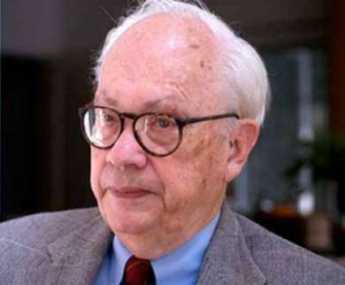 I hear, but scarcely can believe, that there is occasional voter fraud.
I hear, but scarcely can believe, that there is occasional voter fraud.
Fisher on Representation Size
 My Legislative district had 224,000 residents, according to the census. If I spent five minutes talking to each one, I wouldn't have time to sleep or eat.
My Legislative district had 224,000 residents, according to the census. If I spent five minutes talking to each one, I wouldn't have time to sleep or eat.
East Jersey's Decline and Fall
 Some day, a novelist will make East Jersey famous. There's lots of material there.
Some day, a novelist will make East Jersey famous. There's lots of material there.
Boundary Disputes
 Boundaries between nations were mainly based on effective military occupation until the Treaty of Westphalia in 1648. After that, established boundaries were mainly based on rivers or mountain ridges. In the Eighteenth Century, surveying instruments made other boundaries practical, but the political system added new quirks. The Articles of Confederation were a make-shift adjustment to changing concepts of boundaries.
Boundaries between nations were mainly based on effective military occupation until the Treaty of Westphalia in 1648. After that, established boundaries were mainly based on rivers or mountain ridges. In the Eighteenth Century, surveying instruments made other boundaries practical, but the political system added new quirks. The Articles of Confederation were a make-shift adjustment to changing concepts of boundaries.
What Is the Purpose of a National Constitution?
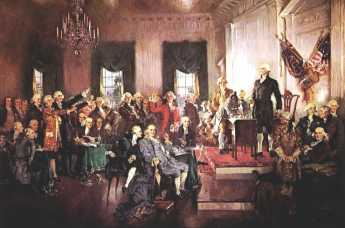 The primary purpose of any Constitution is of course survival. Usually, but not invariably, that means avoiding war with a neighbor which will surely beat you. Having stated what ought to be obvious, the framers of a Constitution need to be careful of the reasons which originally caused the new state to be formed, and also need to avoid provisions which would cause trouble by inciting some different type of governance. These features can be enumerated, but are easily forgotten.
The primary purpose of any Constitution is of course survival. Usually, but not invariably, that means avoiding war with a neighbor which will surely beat you. Having stated what ought to be obvious, the framers of a Constitution need to be careful of the reasons which originally caused the new state to be formed, and also need to avoid provisions which would cause trouble by inciting some different type of governance. These features can be enumerated, but are easily forgotten.
Aftermath: Who Won, the States or the Federal?
 The auto and the jet plane changed all the rules of the American Constitution of 1787. Curiously, canals were central to the Peace of Westphalia of 1648, the other great political innovation of modern times.
The auto and the jet plane changed all the rules of the American Constitution of 1787. Curiously, canals were central to the Peace of Westphalia of 1648, the other great political innovation of modern times.
How Does New Jersey State Aid Affect School Districts?
 State aid for schools is like health insurance: costs go up faster when you aren't spending your own money. At least, that's what the New Jersey statistics seem to show.
State aid for schools is like health insurance: costs go up faster when you aren't spending your own money. At least, that's what the New Jersey statistics seem to show.
George Washington Demands a Better Constitution
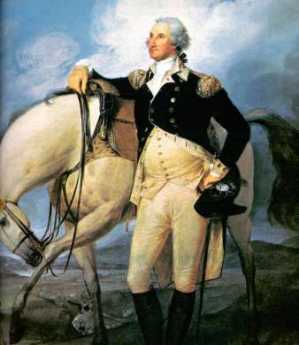 George Washington was an athlete, a soldier, and an adventurous leader. It is less appreciated that he constructed that aloof public image of himself, cloaking an activist politician and rather ambitious real estate developer. We got a new Constitution because he wanted a new constitution.
George Washington was an athlete, a soldier, and an adventurous leader. It is less appreciated that he constructed that aloof public image of himself, cloaking an activist politician and rather ambitious real estate developer. We got a new Constitution because he wanted a new constitution.
Bi-state Fishing
 When Quakers lined both shores of a river, even a state boundary couldn't interfere with fishing.
When Quakers lined both shores of a river, even a state boundary couldn't interfere with fishing.
